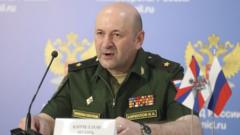Igor Kirillov, who served as the head of Russia's Radiation, Chemical, and Biological Protection troops, was killed in an explosion in Moscow amidst accusations of overseeing chemical weapons use in the Ukraine conflict. While sources connected to Ukraine’s SBU claimed responsibility, labeling the incident a necessary operation against a "war criminal," Russian officials portrayed Kirillov as a national patriot.
Kirillov's death, resulting from explosives concealed in an electric scooter, occurred as he exited his residence in south-eastern Moscow. His controversial role, which included frequent disinformation briefings for the Kremlin, earned him the reputation as a significant propagandist. As leader of the Radiation, Chemical, and Biological Protection Forces since 2017, his duties extended to identifying contamination threats and employing incendiary weapons, raising concerns about the deployment of chemical agents in warfare. The UK Foreign Office condemned Kirillov's unit for allegedly utilizing chemical weapons in Ukraine, citing cases of chloropicrin use among other toxic substances.
Notably, the Ukrainian SBU's claim that Kirillov was linked to a criminal case for utilizing prohibited chemical weapons only intensified the narrative surrounding his death. They reported over 4,800 incidents of chemical munitions used against Ukrainian forces since the inception of the full-scale Russian invasion in February 2022.
Kirillov's notoriety stemmed from various unfounded accusations aimed at Ukraine and Western nations, including claims of U.S. biological weapon labs in Ukraine, used to justify Russia's military actions. Despite rigorous fact-checking by independent experts, his arguments gained traction among pro-Kremlin outlets.
The Russian military and political establishment reacted strongly to his death, deeming it a severe loss. Prominent politicians expressed their sentiments with a minute's silence in the Duma, and some speculated that foreign intelligence services, such as U.S. or British operatives, might be responsible for the assassination. This event not only paints a grim picture of the ongoing conflict but also underscores the increasingly aggressive engagements between Ukrainian forces and Russian high-ranking officials.
















